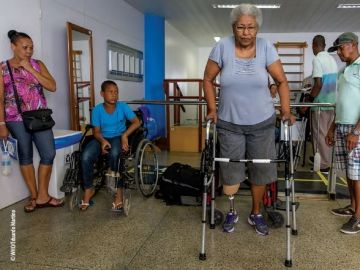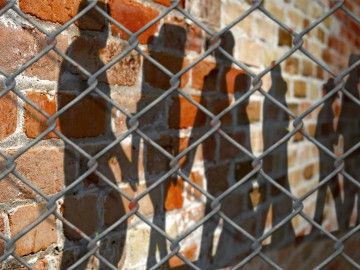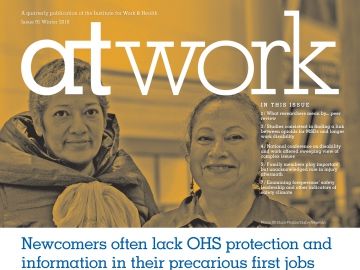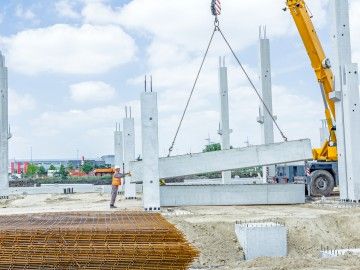What's new

Job opportunity: IWH seeking Assistant Project Manager for World Congress 2020
IWH is seeking a qualified person for the position of Assistant Project Manager to help with the World Congress on Safety and Health at Work, taking place in Toronto in October 2020. The World Congress is the world’s largest event for the international occupational health and safety community and will draw more than 3500 delegates from more than 150 countries. As part of the World Congress project team, the Assistant Project Manager will play a central role in coordinating the planning for this global event. The deadline for applications is April 20, 2018.

Research impact: WHO rehabilitation guidelines build on IWH systematic reviews
In February 2017, the World Health Organization released its report Rehabilitation in health systems. Aimed primarily at low- and middle-income countries, the report sets out evidence-based recommendations to help government leaders and health policy-makers develop or extend rehabilitation services and deliver them equitably within existing health systems. Five of the nine recommendations contained in the report relied on the evidence synthesized by a research team from the Institute for Work & Health.

Study: Newcomers often lack OHS protection and information in their precarious first jobs
Four themes emerged in an Institute for Work & Health study on the labour market experiences of newcomers to Canada: they have great difficulty finding work; their first jobs are often precarious; they rely heavily on community networks; and their knowledge of workplace health and safety is limited. The researchers suggest more settlement agencies offer OHS information as a regular part of their language training and employment preparation services, as some already do.

Study: Family members play important role in work injury recovery
When someone gets injured, family members often rally to help with chores, shoulder the child- or elder-care burden, and cope with the financial impact. The support family members provide in the aftermath of an injury runs the gamut and yet is seldom formally acknowledged by compensation systems in policy or procedure. This is according to a study conducted in Australia by an IWH scientist while she was there on sabbatical.

IWH Speaker Series—March 27: Differences in risk of workplace violence for women and men
Workplace violence is getting increasing attention, especially in sectors such as health care and education. On March 27, IWH Speaker Series presents Institute for Work & Health Senior Scientist Dr. Peter Smith, who will talk about two of his recent studies on differences in the risk of workplace violence for men and women. One examined the contribution of work-related factors to the risk of different types of violence, and the other examined risks in different Ontario industries.
IWH scientist awarded 2018-19 Mayday Pain and Society Fellowship
Institute for Work & Health Scientist Dr. Andrea Furlan is among 12 pain experts in the United States and Canada to win a 2018-19 Mayday Pain and Society Fellowship. The 12 winners will attend a four-day workshop in Washington, D.C. to learn skills to effectively communicate and advocate for the translation of scientific research and evidence-based best practices in pain care and management.

IWH Speaker Series—March 20: Understanding flame retardant hazards in e-waste recycling
As a result of efforts to stem the export of electronic waste to low- and middle-income countries, e-waste recycling is a growing industry in parts of Canada. At an IWH Speaker Series presentation on March 20, Dr. Victoria Arrandale of the Occupational Cancer Research Centre discusses the hazards faced by e-waste recycling workers. She focuses on the hazards of flame retardants, which have been linked to endocrine disruption, neurological outcomes and reproductive effects.

WSPS small business strategy taps into IWH's model of breakthrough change
In 2016, IWH Scientist Dr. Lynda Robson created a model of “breakthrough change” based on her research into the critical factors behind large and sustained occupational health and safety improvements in organizations. In a new impact case study, Workplace Safety and Prevention Services (WSPS) Small Business Director Harry Stewart describes the many ways WSPS's small business strategy builds on that model, which he describes as the "foundation for how we’re moving forward."

Join us May 8-9 at Work, Migration & Health Forum
On May 8 and 9, 2018, join researchers, advocates and policy-makers in Toronto at the Work, Health and Migration Forum. The event, hosted by the Occupational Health Clinics for Ontario Workers (OHCOW) and the Dalla Lana School of Public Health, is examining the labour experiences of temporary foreign workers, new immigrants, refugees, working international students and undocumented migrants. IWH and Wellesley Institute are sponsoring the event.

Read the Winter 2018 issue of At Work
Learn about the experiences of newcomers to Canada when looking for and finding a job–and what they’re told or not told about their health and safety rights and responsibilities. Read about a systematic review on the link between work outcomes and opioids prescribed to treat acute musculoskeletal disorders (MSDs). Find out the impact an injury can have on family members, and how compensation systems can respond to help improve recovery. And more ....

Institute for Work & Health welcomes new member to the KTE Advisory Committee
The Institute for Work & Health (IWH) is honoured to welcome Tom Zach to its Knowledge Transfer and Exchange Advisory Committee (KTEAC). Zach has worked as a communications professional within the public and private sectors for over 30 years. Currently, he is the director of government and stakeholder relations at the Public Services Health and Safety Association. He is there on secondment from his previous position as director of communications and marketing for the Ontario Ministry of Labour. Zach replaces Maria Papoutsis, who retired last year from her role as director of the Health and Safety Policy Branch at the Ontario Ministry of Labour.

Examining forepersons’ safety leadership and other indicators of safety climate
What are the indicators that a construction jobsite has a positive safety climate? In the 2017 Nachemson lecture, Dr. Linda Goldenhar shares the research and practical tools developed at CPWR—The Center for Construction Research and Training.

Measuring the burden of cancer in Ontario
How many workers in Ontario develop cancer due to work exposure to the sun every year? What about exposure to diesel exhaust or crystalline silica? In an ambitious collaborative project, a team of researchers from across Canada have sorted through census records going back 40 years to estimate the number of people exposed to carcinogens at work. Dr. Paul Demers, director of the Occupational Cancer Research Centre and one of the scientists on the team, recently shared his methods and findings at an IWH Speakers Series presentation.

CRE-MSD webinar offers scan of disability management options in Canadian workplaces
Learn about good practices for reducing work disability in an upcoming webinar by IWH Senior Scientist Dr. Emile Tompa and University of Waterloo’s Dr. Amin Yazdani. As part of their work on developing the Canadian Standard for Work Disability Prevention Management Systems, Tompa and Yazdani have conducted interviews with representatives of exemplary organizations, policy-makers, and program providers across Canada. They share findings of this environmental scan in a noon-hour webinar on February 23. And in a second webinar on March 2, the two are back to offer updates on the development of the standard. Both webinars are offered by the Centre of Researoch Expertise for the Prevention of Musculoskeletal Disorders (CRE-MSD). Both require registration.

Help us find out what works in MSD prevention
Help us learn about current workplace strategies to prevent work-related musculoskeletal disorders (MSDs). Take our survey, and tell us what MSD prevention practices you or your workplace are currently using, what is working and what is challenging. Your answers will help shape an easy-to-use free guide that details how to manage MSDs in the workplace, being developed by a team of researchers at IWH.

National conference on disability and work offered sweeping overview of complex issues
A three-day conference co-hosted by the Centre for Research on Work Disability Policy in November 2017 brought together injured workers, people with disabilities and representatives of diverse stakeholder groups. The barriers they identified to greater inclusion in the labour market were many.

IWH in the media: Can data help prevent workplace injuries and death?
Can big data—and its less complex sibling, routine data—help prevent injuries and death? Yes, say Institute for Work & Health (IWH)'s Dr. Chris McLeod and Dr. Cameron Mustard in a January 28, 2018, article in the Journal of Commerce. Routine data has been put to productive use in Ontario, where the Ministry of Labour learned that falls from heights (more than three metres) were the biggest cause of traumatic death in the construction industry, says Mustard, president of IWH.

Do workers exercise more when their employers offer health promotion programs?
Many workplaces offer wellness programs and facilities that support physical activity near or at work. But do these offerings actually get workers to exercise more? IWH’s Mustard Post-doctoral Fellow Dr. Avi Biswas recently conducted a study on the link between access to such programs/facilities and the leisure time physical activity of employees. The results are encouraging. He shared his findings at a recent IWH presentation, now available as a slidecast.

IWH in the media: Marijuana in the workplace. What is unsafe?
"What is striking is how little high-quality evidence there is on the impacts of marijuana in the workplace and how inconsistent the existing data is. We urgently need high-quality observational research studies to be able to better understand the effects of marijuana on work. We also need to develop an accurate measure of impairment for use in Canadian workplaces."—Dr. Andrea Furlan and Dr. Nancy Carnide, in The Conversation, January 22, 2018

CRE-MSD webinars: evidence on safe client handling, and apps to support good posture
If you’re interested in preventing injuries among health-care workers, don’t miss two webinars being offered by the Centre of Research Expertise for the Prevention of Musculoskeletal Disorders (CRE-MSD) this month. On January 19, IWH Scientist Dr. Dwayne Van Eerd provides an overview of the latest evidence on awkward postures when handling clients or patients in a health-care setting. Then, on January 31, two CRE-MSD researchers review SafeBack and PostureCoach, two prototype smartphone apps designed to help health-care workers adopt safer postures. Both webinars require advanced registration.

People with disabilities face greater OHS vulnerability, according to IWH study
People with disabilities have a tough time getting hired, research elsewhere has shown. Now, a new IWH study suggests that, when they do find jobs, they may be more vulnerable to workplace health and safety risks than their peers without disabilities. The study used an occupational health and safety (OHS) vulnerability framework developed at IWH. It found low OHS empowerment and inadequate OHS practices and policies were more prevalent among study participants with disabilities than those without.

Young people with arthritis find disclosing their condition a challenge: IWH study
If you were 22, trying to get a career started, and you had arthritis, would you tell your boss or co-workers about it? Institute for Work & Health (IWH) Associate Scientist Dr. Arif Jetha recently looked into the experiences of young people with chronic conditions. And he heard from participants who faced difficult choices around whether or not to disclose their health conditions. His study, published in the journal Disability and Rehabilitation, explored the issues.

How IWH researchers addressed essential skills gaps in an OHS training program
Can an OHS training program be improved by modifying it to address gaps in essential skills? In a new study, a research team at IWH pilot-tested a modified version of a hoisting and rigging training program offered by the Labourers’ International Union of North America (LiUNA) Local 506. The changes were made to address trainees’ skills gaps in numeracy and document use that were related to the job. Last November, the team presented its findings, and that presentation is now available as a slidecast. Good news: it turns out the trainees in the program modified to address essential skills did better.

IWH Speaker Series: new year, new name
Happy new year! With the start of 2018, here's a reminder that the long-running IWH plenary series has been renamed the IWH Speaker Series: New and Emerging Research in Work and Health.
The hour-long public presentations, by work and health researchers from IWH, across Canada and around the world, are usually held at 11 a.m. Tuesdays at the Institute’s downtown Toronto location. People who can’t attend in person can watch the presentation via a live stream. Check the schedule often for upcoming presentations, including two this month—one on the burden of occupational cancer and the other on workplace interventions to manage depression.

Announcing the Institute’s 2017/2018 Syme training fellows
Congratulations to three public health researchers who have been named recipients of IWH’s 2017/2018 S. Leonard Syme Training Fellowships in Work and Health. The fellowships were established in honour of Dr. Syme, a pioneer in the field of social epidemiology and chair of IWH’s Scientific Advisory Committee from 1995 to 2002. The three recipients and their research projects are:
- Meghan Crouch, University of Waterloo—Mental health in the workplace;
- Kimberly Sharpe, University of British Columbia—Regional variation in health care in five Canadian workers’ compensation systems and its relationship to return to work; and
- Robert Shaw, University of British Columbia—Supporting employment for young adults with disabilities.

A Q&A on what we know—and don’t know—about marijuana and workplace safety
The federal government says it’s committed to legislation making recreational cannabis legal by July 1, 2018. As that date approaches, many workplace parties are concerned about the implications for occupational health and safety (OHS). So what does the research to date say about marijuana use and OHS? Find out in a Q&A with two of our researchers. (Hint: There’s a lot we need to learn.)

Standing too long at work linked to increased risk of heart disease
There has been a lot of interest in recent years in the health risks of prolonged sitting. However, a recent study by IWH and the Institute for Clinical Evaluative Sciences found the risk of heart disease is twice as high for people in jobs that mostly involve standing (e.g. cooks, tellers, cashiers) compared to those in jobs that involve mostly sitting. Read about the findings, and check out a sidebar that tackles some of the misconceptions out there about the study. (Here’s one: It’s not about standing desks.)

Study on prolonged standing and heart disease: Setting the record straight
Sitting or standing at work? An IWH research team tackles three common misconceptions about the implications of IWH's prolonged standing study.